Episodes
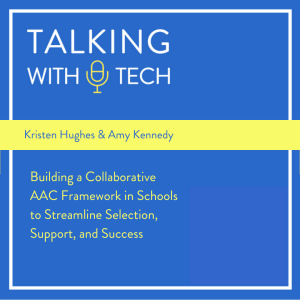
Wednesday Oct 30, 2024
Wednesday Oct 30, 2024
This week, we share Chris’s interview with Kristen Hughes and Amy Kennedy! Kristen and Amy both work for Baldwin County Public Schools; Kristen as a speech-language pathologist and Amy as a special education resource consultant. Kristen is also a parent of a six-year-old son who uses AAC. Kristen is transitioning into a new role as an AAC specialist within her school district, and she wanted to ask Chris more about the Specific Language System First approach, leveraging collaboration, refining selection processes, and supporting educators with resources and training.
Before the interview, Chris shares experiences from a recent classroom lesson that unexpectedly turned into a broader discussion about fostering AAC culture for a whole school!
Key ideas this week:
🔑 Collaborative Decision-Making for AAC Selection: Kristen and Amy, along with Chris, emphasize a structured, team-based approach to selecting AAC tools. Instead of relying solely on a single expert’s choice, they suggest involving a full team—including teachers, parents, and relevant therapists—to determine the best AAC solution for each student. This approach helps foster shared ownership of the decision, ensuring consistent implementation and increased buy-in from all parties.
🔑 Efficient AAC Implementation Process: The team explores the idea of moving away from lengthy “trial” periods in favor of setting up a solid decision-making framework that defines criteria for selecting AAC tools based on specific student needs. By doing this, they aim to streamline the AAC selection and implementation process, helping reduce delays and allowing students to start benefiting from the tools more quickly.
🔑 Increased Support and Training for Educators: Recognizing time and comfort with AAC as barriers, they discuss the importance of training and support for teachers. Implementing consistent resources, like core boards and training on specific AAC tools, would empower teachers to integrate these tools more naturally in the classroom, reducing abandonment and ensuring AAC devices are used effectively.
Visit talkingwithtech.org to listen to previous episodes, find new resources, and more!
Help us develop new content and keep the podcast going strong! Support our podcast at patreon.com/talkingwithtech!
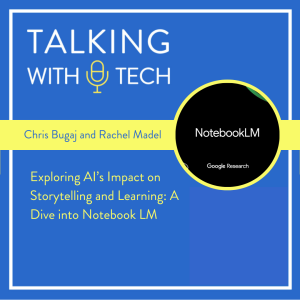
Wednesday Oct 23, 2024
Wednesday Oct 23, 2024
This week, Chris and Rachel share about NotebookLM.google.com, an AI website that will do things like create an actual “podcast episode” about an uploaded document or webpage! Chris and Rachel share some of the things they have created with this tool and ideas about how to quickly create engaging materials for your students.
Key Ideas this Week:
🔑 AI-generated content for educational purposes: Chris and Rachel explore the use of AI to generate podcasts and conversational content based on text inputs through the website NotebookLM.google.com. They discuss the potential of using this technology to make learning materials more engaging for students, like listening to two hosts discuss educational content with emotion instead of just reading.
🔑 Impact of storytelling in learning: Rachel emphasizes the importance of storytelling in helping people engage with and retain information. She highlights how AI-generated discussions can create narratives that make dry or complex content more accessible and memorable.
🔑 Potential and concerns of AI in professional and personal contexts: While the technology is praised for its ability to save time and increase productivity (e.g., turning a slide deck into a podcast), both hosts also express concerns about the ethical implications, such as deepfakes and the possibility of AI being used maliciously. AI’s potential for both positive and negative impact is a recurring theme throughout the conversation.
Links from this Week’s Episode:
NotebookLM.google.com
ifaketextmessage.com
Visit talkingwithtech.org to listen to previous episodes, find new resources, and more!
Help us develop new content and keep the podcast going strong! Support our podcast at patreon.com/talkingwithtech!
.

Wednesday Oct 09, 2024
Wednesday Oct 09, 2024
This week, we share Rachel’s interview with Anand (@anandmurthy) and Amanda Murthy (@amandajanemurthy)! Anand and Amanda’s son, Maverick, is affected by infantile spasms, a rare form of epilepsy. Maverick has undergone multiple brain surgeries and faced numerous challenges related to his condition. Anand and Amanda share about their journey to raise awareness about infantile spasms, the importance of collaboration among healthcare providers, the need for comprehensive support systems for families of children with complex medical needs, and more!
Key Ideas this Week:
The Complexity of Infantile Spasms Anand and Amanda share the difficulty in diagnosing and treating their son Maverick's condition, infantile spasms, a rare form of epilepsy. They discuss the challenges of working with a medical system that often lacks awareness of infantile spasms and the need for immediate intervention, such as EEGs, to properly diagnose and manage it.
The Importance of Advocacy and Persistence: The Murthys emphasize the importance of advocating for their child in the medical system, navigating insurance challenges, and ensuring Maverick receives appropriate care. They discuss how parents need to be assertive with insurance companies and sometimes even with medical professionals to secure necessary treatments.
Collaboration in Therapy and AAC: The interview highlighted the significance of a multidisciplinary approach to Maverick’s therapy, including speech, occupational, and physical therapy, as well as ABA for autism. They also touched on the challenges of using Augmentative and Alternative Communication (AAC) for a child with complex needs and the importance of having a cohesive and collaborative team to support his progress.
Visit talkingwithtech.org to listen to previous episodes, find new resources, and more!
Help us develop new content and keep the podcast going strong! Support our podcast at patreon.com/talkingwithtech!
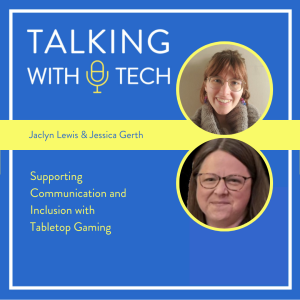
Wednesday Sep 25, 2024
Wednesday Sep 25, 2024
Jessica Gerth and Jaclyn Lewis
This week, we share Chris’s interview with Jessica Gerth and Jaclyn Lewis! Jessica (@chaoscommunicationconverse) is a speech pathologist who utilizes TTRPGs to enhance communication and social skills among her students. Jaclyn (@wranglerofchaos) is a writer, youth worker, and game master who wrote "Rolling with the Youth," a book focusing on fostering safe and fun spaces through role-playing games. Together, they emphasize the importance of inclusivity in gaming, aiming to provide all children, regardless of their backgrounds or abilities, a place at the table!
Before the interview, Chris and Rachel discuss their shared sense of optimism for the future of AAC, and some of the possible sources for their positive outlook. They connect this optimism with the concept presuming potential, which requires an unwavering belief that students have the potential to grow and make progress!
Key ideas this week:
The Power of Role-Playing Games (RPGs) in Education and Therapy: Jessica and Jaclyn emphasize how tabletop role-playing games, like Dungeons & Dragons, can be used for educational and therapeutic purposes. These games provide opportunities for language development, social skills practice, and creativity. Jessica shares how she incorporates elements of these games into her work with students, particularly those on the autism spectrum, helping them with communication and engagement.
Inclusivity in RPGs: The interview highlights the importance of creating inclusive spaces in role-playing games. Jaclyn discusses her work on making RPGs accessible to everyone, particularly younger players and those from diverse backgrounds. She and Jessica both emphasize the role of representation, where characters like Yumi, who uses an AAC device, offer both visibility and understanding of different abilities within the game.
Safe and Supportive Game Environments: Jessica and Jaclyn explore how to create a safe environment for players through tools like "Session Zero," where expectations are set, and safety tools like the X-card, which allow players to signal discomfort. This ensures that games are not only fun but also emotionally and socially supportive for players of all backgrounds and abilities.
Links from this Episode:
“Rolling with the Youth” by Jaclyn Lewis: https://www.indiepressrevolution.com/xcart/Rolling-with-the-Youth.html
Visit talkingwithtech.org to listen to previous episodes, find new resources, and more!
Help us develop new content and keep the podcast going strong! Support our podcast at patreon.com/talkingwithtech!
.
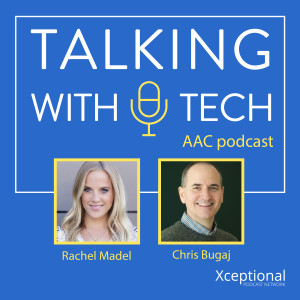
Thursday Sep 19, 2024
Thursday Sep 19, 2024
This week, we share Rachel’s interview with Amanda Diekman! Amanda (@lowdemandamanda)is an autistic adult and parent of three neurodivergent children who advocates for a shift away from traditional parenting models that prioritize control and demands. She suggests that accommodating children's needs and reducing expectations can foster better emotional connections. The interview underscores the significance of empathy, patience, and the need for adults to reflect on their own emotional responses to better support children in navigating their challenges!
Before the interview, Rachel and Chris discuss some recent work that Rachel is doing on a yet-to-be-released update of her course, AAC Ally! Rachel shares that, since the previous version of AAC Ally focused more on assessment, the new version of AAC Ally will focus more on implementation and treatment. Rachel suggests that you sign up for her newsletter at rachelmadel.com/optin to receive updates on when the updated AAC Ally releases!
Key Ideas this Episode:
Radical Acceptance and Safety: Amanda emphasizes the importance of creating a sense of safety in children by aligning expectations with their capabilities. This involves understanding and accepting children as they are, without imposing overwhelming demands that trigger stress and make them feel unsafe.
Non-Verbal Communication and Co-Regulation: Amanda explains that much of the communication with children, especially neurodivergent ones, can be non-verbal. Parents and caregivers should rely on their own nervous systems to co-regulate, recognizing distress signals and providing calm and connection to bring children back to a state of safety.
Letting Go of Control: A major aspect of low-demand parenting is learning to release control and lower demands when children are overwhelmed. Rather than doubling down on rules or consequences, Amanda advocates for letting go of unrealistic expectations in the moment to restore emotional safety and connection.
Visit talkingwithtech.org to listen to previous episodes, find new resources, and more!
Help us develop new content and keep the podcast going strong! Support our podcast at patreon.com/talkingwithtech!

Wednesday Sep 11, 2024
Wednesday Sep 11, 2024
This week, we interview Brianna Hughes and Tiffany Rezvani! Brianna and Tiffany are Speech-Language Pathologists and AAC Specialists based in Northern California. They share all about the free AAC screening tool they created, called AAC Screening, that helps educators and clinicians efficiently identify students who may benefit from AAC devices!
Before the interview, Chris shares some exciting news about going to Communication Matters in the UK this year! Chris will try and gather recordings while he is at the conference to share on a future podcast!
Key Ideas this Week:
Development of an AAC Screening Tool: Brianna and Tiffany created an AAC screening tool designed to streamline the assessment process for students in moderate and moderate-severe self-contained classrooms, particularly focusing on younger students (pre-K to kindergarten). This tool helps identify students who need AAC support more efficiently, allowing professionals to allocate more time to implementation rather than lengthy assessments.
Benefits of Screening and Implementation: The AAC screening tool has reduced the stress on staff by ensuring that students are identified early, speeding up the provision of AAC devices, and freeing up time for training and support. This approach aligns with the specific language system first model, emphasizing quicker access to AAC and increased focus on real-world application and modeling rather than exhaustive device trials.
Building a Supportive AAC Culture: By screening entire classrooms and often standardizing the systems used within them, the tool has helped foster a more confident and capable environment among teachers and staff. This approach has integrated AAC into daily routines and academic curricula, leading to improved communication and literacy outcomes for students, which benefits everyone involved in the education process.
Links from This Episode:
AAC Screening Tool: aacscreen ing.com
Visit talkingwithtech.org to listen to previous episodes, find new resources, and more!
Help us develop new content and keep the podcast going strong! Support our podcast at patreon.com/talkingwithtech!

Wednesday Sep 04, 2024
Wednesday Sep 04, 2024
This week, Chris interviews Marnina Allis and Marisa Portanova, two speech-language pathologists at Blythedale Children’s Hospital, the only independent specialty children’s hospital in New York State! Marnina and Marisa share about their role on the core assistive technology (AT) team, ideas for supporting AAC users and their families outside the hospital, taking a team-based approach to treatment, and more!
Before the interview, Chris and Rachel share about starting the school year and how changing school teams often bring a certain amount of new energy to school sites. Chris also shares about one of his favorite things to start the school year - donning the costume of Shadow the Dog, the mascot for his wife’s elementary school!
Key Ideas This Week:
1. Collaborative Approach to AT and AAC: Marnina and Marisa emphasize the importance of a collaborative approach at Blythedale Children’s Hospital, involving a core AT team that includes speech therapists, occupational therapists, physical therapists, and a rehab engineer. This team works together to provide comprehensive support to pediatric patients with complex needs, ensuring that assistive technology solutions are tailored to individual requirements and are integrated into the patients' everyday lives.
2. Focus on Family and Community Involvement: The interview highlights the hospital's commitment to involving families in the therapy process, empowering them to feel comfortable and capable of using assistive technology with their children. They aim to provide ongoing education and support to families, recognizing that successful communication strategies need to be practiced in all environments, including home and school.
3. Make Learning Language Fun: Marnina and Marisa discuss their implementation of group therapy sessions that focus on fun, engaging activities like games and themed literacy projects, which allow children to interact socially while working on communication goals. This creates a supportive, interactive environment that promotes skill development and community building among AAC users.
Links From This Episode:
TED Talk - Derek Shivers: How To Start a Movement
Visit talkingwithtech.org to listen to previous episodes, find new resources, and more!
Help us develop new content and keep the podcast going strong! Support our podcast at patreon.com/talkingwithtech!
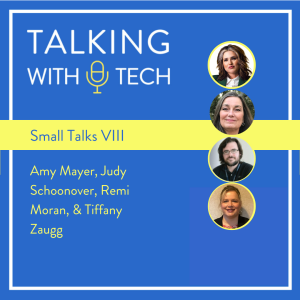
Wednesday Aug 28, 2024
Wednesday Aug 28, 2024
This week, we share a series of “Small Talks,” e.g. short recordings (less than 15 minutes) about a single topic of interest with guests Amy Mayer, Judy Schoonover, Remi Moran, and Tiffany Zaugg!
Before the Small Talks, Rachel discusses presenting ant an online autism summit about some of the fundamentals of AAC. Meanwhile, Chris shares about recording some trainings on the “specific language system first approach” with some groups in Israel, including a presentation at the ISSAC Israel Conference where participants watched a prerecorded video, then did a live Q&A over Zoom.
Small Talks This Episode:
Amy Mayer: Question Slips - Sometimes, as a teacher, it gets overwhelming constantly being asked questions that are about trivial things, like using the bathroom or which color pen to use, and Question Strips are a strategy that can help! You put students in teams, and they are given slips that allow them to ask a question. The trick is, there are a limited number of slips, and all members of the group must sign off that this is what they want to ask. This dramatically reduces irrelevant question. Since students often want to save the slips for another time, they collaborate and solve their problems themselves!
Judy Schoonover - Favorite Purchases from the Dollar Store: Something as simple as a pool noodles can be used as a pencil grip, as adaptive seating, converted into a foot fidget, made into a whisper tube, and more! Similarly, the Dollar Store sells thin kitchen rugs (18 x 24) are velcro sensitive, so when you fasten velcro dots to something, it will stay and not move! Tips on uses for Dollar Store cookie sheets, plastic protectors, plastic plates, and push lightsare also shared!
Remi Moran: Creating a 50 Inch Touchscreen out of a TV - Remy bought an infrared frame that goes around his TV. The frame acts as a mouse pointer, essentially converting the TV into a large touchscreen. Remy shares how he puts videoes at the top and practices using AAC with his daughter at the bottom.
Tiffany Zaugg: DebriefScape - UCF has a tool called debrief scape that allows you take video you have and tag certain moments on the video. you want to discuss. You can also tag lots of different spots on the video. This tool can be really useful for providing coaching and feedback when teaching someone about AAC using video, as recommended in programs like SMORRES.
Links from This Episode::
Pool Noodles as Assistive Technology: https://blog.therapro.com/pool-noodle-as-assistive-technology/
Dollar Store Hacks for the Classroom https://www.weareteachers.com/50-dollar-store-hacks-for-the-classroom/
Writing Wizard: https://apps.apple.com/us/app/writing-wizard-school-ed/id631446426
Word Wizard: https://apps.apple.com/us/app/word-wizard-for-kids-school-ed/id447312716
DebriefScape: https://www.cs.ucf.edu/~ceh/EDGrants/DScape/
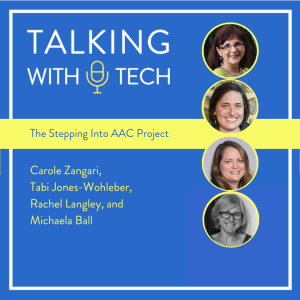
Thursday Aug 15, 2024
Thursday Aug 15, 2024
This week, Rachel and Chris interview the superstar members of the “Stepping Into AAC” project - Carole Zangari, Tabi Jones-Wohleber, Rachel Langley, and Michaela Ball! The “Stepping Into AAC” team shares about the core mission of the project: to introduce people to AAC, to guide them through the early months of using these new communication tools and strategies, and to offer resources to engage school teams and other caregivers. The program is divided into 20 parts with the intention to complete one part a week, making it more manageable!
Before the interview, Chris and Rachel share about their experience over the summer meeting up in Virginia! Chris also shares about Jennifer Wexton, a congresswoman with progressive supranuclear palsy who recently became the first person to use AAC on the floor of the House of Representatives!
Key Ideas This Episode:
Family-Centered AAC Education and Support: The “Stepping Into AAC" project focuses on helping families understand and implement AAC through accessible training materials. These materials include videos, hands-on activities, and newsletters designed to empower families of individuals with Angelman syndrome and other AAC users by offering practical tools for communication development.
Habit Formation as Key to AAC Success: The “Stepping Into AAC” project emphasizes the importance of habit formation for long-term success with AAC. By breaking AAC learning into manageable steps and activities spread over 100 days, the program encourages families to develop habits that integrate AAC into daily life, making it more natural and sustainable over time.
Building Community Around AAC: The project recognizes the need for community, not just around the individual AAC learner but also for families. This includes support from other families on the AAC journey, professionals, and local communities, creating a sense of shared experience and providing much-needed encouragement and credibility to families advocating for their loved ones.
Links from This Episode:
Stepping Into AAC: https://www.angelman.org/stepping-into-aac/
Eleven Labs: https://elevenlabs.io/
Help us develop new content and keep the podcast going strong! Support our podcast at patreon.com/talkingwithtech!
Visit bit.ly/twtpod for access to previous episodes, resources, and CEU credits that you can earn for listening to TWT episodes!
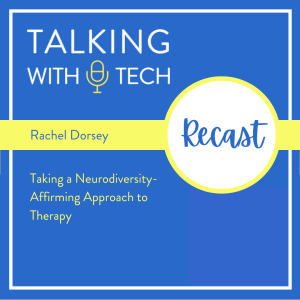
Wednesday Aug 07, 2024
Wednesday Aug 07, 2024
This week, we present a Recast episode of Rachel's interview with Rachel Dorsey, an amazing autistic SLP who teaches courses on neurodiversity and goal writing. Recast episodes are previous episodes of TWT that Chris and Rachel want to highlight. In this Recast, Rachel Dorsey shares her perspectives on neurodiversity, how to help shift the perspectives of others to better affirm neurodiversity, the importance of co-regulation for Autistic people, and more! Before the interview, Rachel and Chris sit down with Melissa Bugaj and Sara Gregory to have a quick roundtable banter about gestalt language processing (e.g. scripting) vs analytical language processing, and ways that all people may use both methods to learn language. Key ideas this week:
🔑 A “neurodiversty affirming approach to Autism” involves respecting everyones differences and seeing people through their strengths and not just their deficits. It Includes listening to people from that community to learn from them how to improve your affirming practices.
🔑 What can we do to help shift people’s perspective to better support neurodiversity? Rachel Dorsey says help these people to ask “why”. Why is this happening? Why are they being disruptive? Why did they go from not being able to do a skill to doing it? Is it environment? Then, shift what you do next time in response to what you learn.
🔑 "Co-regulating" can happen in therapy when both therapist and the student (or client) help each other regulate. This will look different for different people. Does the Autistic person like to be left alone to do their own thing? Do they enjoy physical presence, or do they want space? Co-regulation helps to build trust and rapport and may help improve progress in therapy down the road.
Visit talkingwithtech.org to listen to previous episodes, find new resources, and more!
Help us develop new content and keep the podcast going strong! Support our podcast at patreon.com/talkingwithtech!
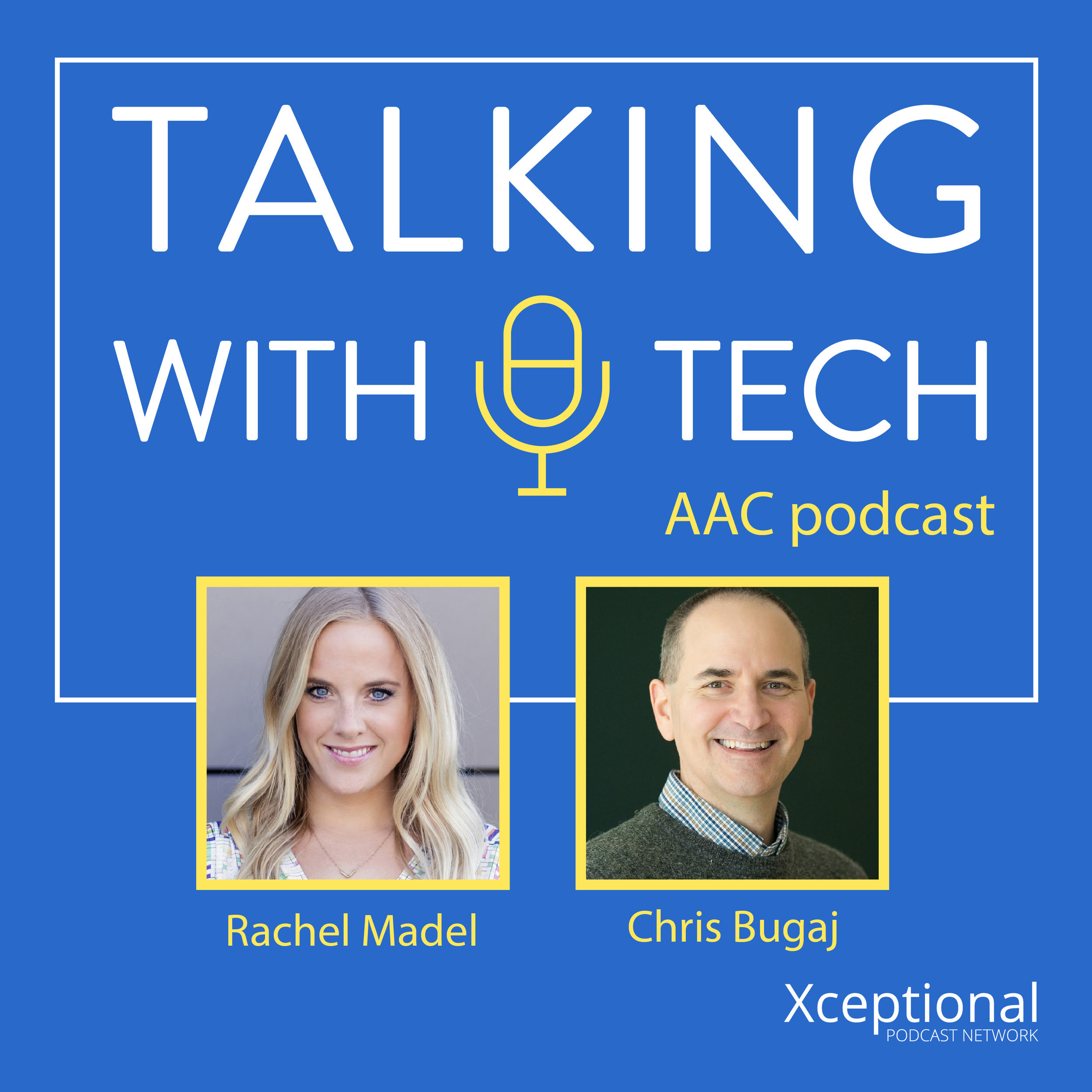
Join AAC experts Rachel Madel and Chris Bugaj as they dive into a weekly discussion about all things AAC (Augmentative and Alternative Communication). Every episode they deliver practical resources, clinical guidelines and relevant research to help clinicians better utilize technology for individuals with complex communication needs.
Episodes include interviews with industry thought-leaders, clinicians, parents, researchers and app developers to keep you on the pulse of the educational technology scene and better support communication through the use of technology.


